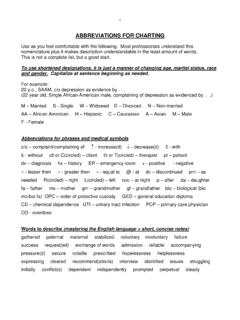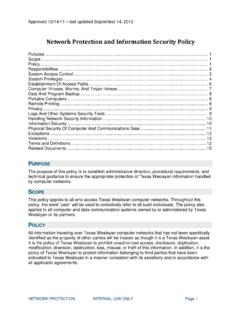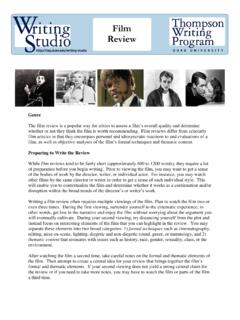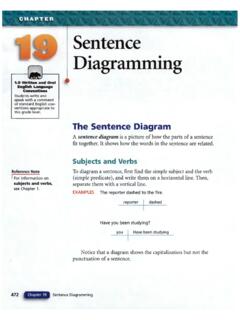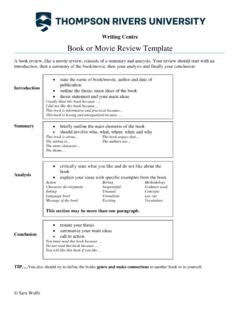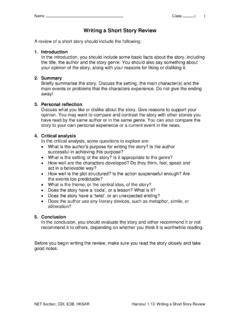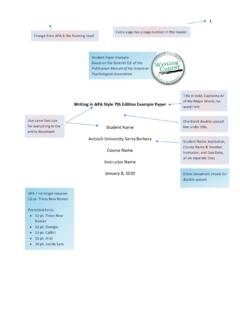Transcription of How to Write a Critical Book Review - Texas Wesleyan …
1 How to Write a Critical book Review A book Review is more than a book report or summary of a book s contents. A Review is a Critical essay evaluating the merits of an academic work. Its purpose is not to prove that you read the book which is understood as a given but to show that you can think critically about what you ve read. You can see examples of reviews in virtually any historical journal, and these may help you to Write your own Review . Reviews are a vital part of academic life, as you will see in the journals. Most professors regularly read and Write reviews to find interesting books, stay informed of new work, and ensure that their voices continue to be heard.
2 A book Review requires a lot of thought and effort. This handout will assist you. The process can be broken down into three main stages: as you read; as you prepare to Write ; and, as you Write . With each stage there are a series of questions and factors to consider as you work on your Review . Many of these issues are interrelated, but in this guide they are broken up to make them easier to understand. STAGE ONE: AS YOU READ You should consider the following issues while you are reading the book to help you better evaluate it. Make notes as you read, so you won t forget your observations or have to go back and hunt for references.
3 A. Purpose/Thesis: What was the author s purpose in writing the book ? Did she state her purpose explicitly or did you have to infer it? The purpose for writing is usually the thesis or argument of the work. (Although academics often Write books to refute another scholar s work or because something is en vogue, the underlying purpose for writing is always to present an argument). Does the book have a clear central thesis/argument? To what extent and how effectively ( , with what kinds of evidence) is this thesis developed? Does the author convince you of the validity of her thesis/argument?
4 B. Sources: What types of sources does the author utilize in presenting the thesis? Are they mainly published documents, or do they include archival records? Does the author draw on other material such as novels, artwork, or interviews? How are the author s sources incorporated into the narrative? Do you think she has tapped all the major sources available or are there omissions? c. Contextualization: How well does the author explain the wider context of the events or developments he is discussing? Is the book narrowly focused or does the author try to connect to wider developments?
5 D. Style: is the book well written? Is it easy to understand? Does it flow well? Is the writing dense and heavy with jargon, making it hard to grasp? Does the author show a flair for effective writing that goes beyond simple communication? Does the writing make the book more interesting? s background: Look into the author s qualifications and experience. Use the web andthe West Library catalogue to explore what other works the author has produced and whattopics they have TWO: AS YOU PREPARE TO Write Once you ve read the book and thought about it, you should start developing the main parts of your Review before you start writing.
6 Think about the following elements and how to include them in your essay. Then you should make a plan laying out the main points in the introduction, body, and conclusion of your paper. The following analogy might help you conceptualize your Review : think of yourself as the judg e in a courtroom. The author is an attorney who has just present his/her case=thesis/argument. It s up to you as reviewer to assess whether or not the author s thesis has validity. As in a court of law, the judge rules on the evidence presented by the attorney.
7 This is what you will do. : Articulate the author s thesis/argument in a clear and concise way. This will be roughlyone paragraph in length and should not be a summary of the different sections or , you should concentrate on the author s central intention behind the book to find aneffective way to sum up the work for your Points: Look back through your notes to pull out your most important observations thismay help you to find a central argument or theme for your Review . Essentially your points arerelated to the evidence the author uses to support his thesis.
8 Did a particular chapter or idea,for example , use evidence that supported the thesis? As you think about the main points thatyou want to make, consider what would be the most effective order in which to present you consider the book successful, for example , you might want to present the parts youconsidered the most effective. You should also think about how you will support your points, asyou do in any other essay. Look for specific examples and short, effective quotes that couldillustrate your ideas, or think about how to summarize sections of the book to support yourcritique.
9 You need to substantiate and illustrate any claims that you : Your Review needs a central argument. In this case it's whether the author has successfully accomplised his or her purpose in writing the book . Considering the author s purpose in writing/thesis/argument, did you find the work generally successful, partially successful, flawed, etc? STAGE THREE: AS YOU Write Your Review is a short Critical essay of approximately 1000-1250 words or 4-5 pages. As you Write and edit your paper, you should ensure that you include the following: This is where you briefly introduce the theme or topic of the work generally and the author's purpose in writing/thesis/argument.
10 The degree to which the author accomplishes that purpose is the thesis of your Review . say somthing about the author's qualifications. This should not be a biography of the author but a concise explanation of the author's background, and those things qualifying him or her to Write this concise profile of the book 's sources. Consider the types of sources the author utilizes in presenting his purpose in writing/thesis/argument. For example , are they published documents, or do they include archival records; does he or she rely on primary and secondary sources and how are the sources incorporated into the narrative?
